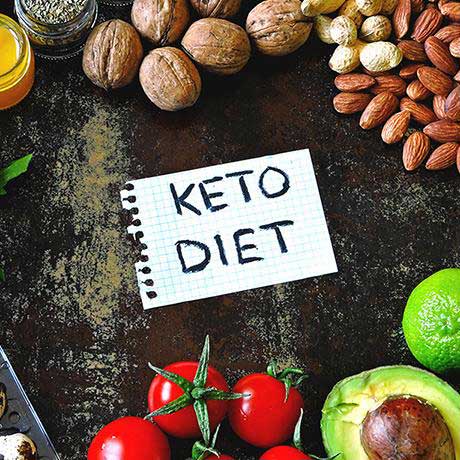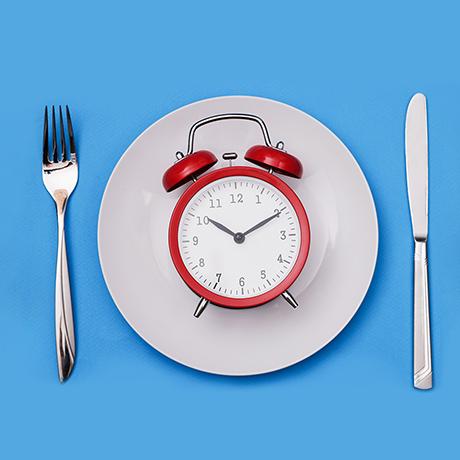- Private & confidential service
- Genuine medication
- All-inclusive service - No hidden fees
- Next day delivery
- Weight Loss
- What should I eat to lose weight?
- 12 nutritionist tips to lose weight
12 nutritionist tips to lose weight
Read our qualified nutritionist’s top tips on successful weight loss
Here at HealthExpress, our qualified nutritionist has a science-backed and empathetic approach to weight loss for people who are overweight or obese.

“Losing weight is a personal journey and is done best without comparing yourself to others”
Silvia Fonda, Nutritionist
Before starting your weight loss journey, she recommends ensuring that you’re not in a stressful place (such as moving house or starting a new job) as this can distract you from committing to your goals.
Below are 12 of her weight loss tips. Start by picking 2 or 3 of her tips and focusing on them for the first week. Then slowly, you can incorporate more over time. Aim to include all of the following within a couple of months.
Drink water
On average we should be drinking about 8 large glasses of water a day (this amount will be higher if you weigh more). Water is important for many functions in our body - it even helps with weight loss.

If you feel hungry, reach for some water rather than food. Mild dehydration can be mistaken for hunger by the brain. Furthermore, choosing water over other drinks (such as juices, fizzy drinks, or sugary teas and coffee) helps to decrease your calorie intake, resulting in further fat loss.
An increase in water may also help the process of fat burning, according to a small study.
Control portion sizes
It is important to eat slightly less than your daily calorie requirement for weight loss to occur. Instead of counting calories, you can try controlling your portion sizes (decreasing them so that you hit your calorie goal).
- Use smaller plates: Sometimes you may need to retrain your brain to be satisfied with a smaller portion than you are used to. Using a smaller plate may help you trick your brain into thinking that you have more food on your plate.
- Don’t double up on your carbohydrates: One portion of starchy carbohydrates per meal is enough. Avoid adding more carbs, such as bread, when your meal already contains one source.
- Follow the 20-minute rule: This involves waiting 20 minutes after a meal to check if you’re still hungry. When you eat, your brain needs extra time to register the food you have eaten. Your stomach tends to get full before your brain has realised.
- Don’t pick at leftovers: We can all agree that wasting food is not ideal - however, by eating leftovers after a meal you are adding to your portion sizes and calories. Best to put leftovers in a container and use them for another meal!
- Read food labels: Check food labels for suggested portion sizes. This may be different from what you are used to.
Cut out alcohol
Alcoholic drinks don’t just add calories - they also have a huge impact on your gut health. Your stomach is home to a diverse and balanced array of good and bad bacteria. Drinking alcohol can disrupt this balance, resulting in acid reflux, diarrhoea, bloating, and other problems.

A healthy gut is beneficial for weight loss too, so drinking more may actually slow down your progress. Additionally, any alcohol you consume is used as a primary energy source, meaning that everything else you eat will be stored in your body as fat.
Consider meal planning
Remove any unhealthy foods from your home before you start your weight loss journey. Start planning your meals and make a shopping list before you go food shopping.
Once you have your ingredients, prepare meals in advance either by batch cooking or meal prepping. This will help to eliminate the temptation to cook something unhealthy when you’re already hungry. It will also prevent you from reaching for caloric snacks or fast food.
Try to encourage the people you live with to support your journey so that they don’t bring unhealthy foods/snacks into your home. If working from home, include some daytime activities to discourage frequent trips to the fridge.
Practise mindful eating
If you live on your own, avoid eating in front of the TV and practice eating mindfully. This means being aware of what you eat and focusing on the experience of food. Mindful eating has been shown to positively contribute to weight loss by improving eating behaviour and habits.
There is evidence that chewing your food for longer can result in a lower calorie intake and weight loss. By focusing on your meal and chewing for longer to enjoy its flavour, you will experience fewer cravings. You will also be more aware of when you have reached a sense of fullness.
Mindful eating can also help you control and overcome emotional eating (when you eat foods to deal with emotions rather than because you’re hungry).
Reach your daily protein goal
You may be tempted to cut down your calories when losing weight. However, it is important to continue eating enough protein to avoid losing muscle mass. In fact, getting enough protein in your diet has many benefits linked to weight loss.
“On average, you should eat 1g of protein per kilo of body weight. Make sure to include protein at every meal, especially breakfast.”
Eating a savoury breakfast that’s high in protein has been shown to positively affect your blood glucose levels later in the day by avoiding spikes. Keeping a steady blood sugar is key to aiding in weight loss as the body can easily lose excess fat if the right hormones are sending messages to the brain to burn fat.

On the contrary, when we eat sugary foods or starches and experience a glucose spike (when the blood glucose level rises quickly), this has a knock-on effect on other hormones which communicate to the brain to stay in fat storage mode.
Including protein at breakfast (such as eggs, fish, seeds, and occasionally lean bacon) can help you feel fuller for longer and will give you more sustainable energy until lunchtime.
Have a vegetable starter
Recent research has shown that when you eat vegetables first, your blood glucose levels remain steadier. Fibre found in veggies helps to slow down the absorption of carbs (which the body breaks down into sugar).
When you avoid glucose spikes, your body uses fat stores as energy, which is good for weight loss. Aim to eat a variety of vegetables, and ensure that they take up ⅓ of your balanced plate.
Opt for low GI carbs
Low GI (glycaemic index) carbohydrates convert more slowly into sugar compared with high GI carbohydrates. This means that they help you maintain steadier blood sugar when eaten as part of a balanced diet.

Examples of low GI carbs include:
- wholegrain rice
- multigrain bread
- sourdough bread
- new potatoes (with the skins on)
- sweet potato
- barley
- quinoa
- oats
Low GI carbs are usually a good source of fibre too. When building healthier eating habits, try to substitute white carbohydrates with low GI sources. For example, swap your white loaf from the supermarket for brown bread instead.
Walk after eating
15 minutes of walking after meals has been shown to positively affect blood glucose levels. This is because it slows down the conversion of food you’ve eaten into sugar.
By avoiding steep glucose spikes, you will keep hormones like insulin more balanced. This is beneficial because weight loss cannot occur when insulin levels are very high.
A brisk walk after meals will also count towards the recommended target of 150 minutes of exercise per week. Remember, exercise accelerates weight loss by increasing the number of calories you burn.
Choosing the right snack
If you have managed to follow some of the above tips, you may not feel like having a mid-morning snack. However, an afternoon snack might help to stabilise your blood sugar and help you reach dinner without becoming overly hungry.

When choosing a snack, aim for something nutritious (healthy foods) that will keep your blood sugar steady. Examples include:
- apple slices coated in nut butter (such as peanut or almond butter)
- some full-fat plain yoghurt with chia seeds and berries
- veggies with hummus
- oatcakes or crackers with nut butter
Don’t skip meals
Sometimes the hecticness of life causes you to skip meals from time to time. Similarly, some fad diets require you to fast or overly restrict your calories.
Whilst you might think that skipping meals will increase weight loss, it can actually slow it down. Negative effects of skipping meals include:
- Your blood sugar dropping: When you don’t eat regularly, you will experience a drop in your blood sugar. Low blood sugar can make you feel tired, dizzy, sluggish and short-tempered. It can also affect your ability to concentrate as your brain doesn’t have the fuel needed to think.
- Your metabolism slowing down: Although a short-term fast (like intermittent fasting) or one missed meal shouldn’t have a negative effect on your metabolism, prolonged fasting can slow your metabolism down and make weight loss more difficult in the long run.
- Your hunger hormones becoming disrupted: Your body has a system of signals called hormones that let you know when you need to eat and when to stop eating. By skipping meals and ignoring these signals, several hormones are disrupted. This makes it harder for you to receive the ‘full’ signal once you do start eating. This could lead to binge eating or overeating.
- Losing the joy of eating: Food restriction is the basis of many eating disorders and can cause you to develop a negative relationship with food.
Manage your stress levels
When considering your weight loss goals, it is almost automatic to consider which foods need to be cut down or avoided. But, successful weight loss goes beyond foods.
Stress management is another key aspect which needs to be addressed when wanting to lose weight.
When we are stressed, cortisol (the stress hormone) is elevated and can result in an increase in blood sugar and appetite.
A slight increase in cortisol level does not tend to be a problem, however, chronically high cortisol has been linked to excess fat.
To avoid cortisol weight gain, there are a number of beneficial activities which can help:
- meditation
- yoga
- exercise
- therapy
- sleeping
- limiting caffeine and alcohol

Silvia Fonda a registered nutritionist here at HealthExpress
A note to remember:
“The above tips can help you in your weight loss journey if used consistently over a period of time. Be patient with the process and remember that sustainable weight loss occurs when you succeed at implementing changes which last in the long term.”
Further reading

What should I eat to lose weight? Does the DASH diet work for weight loss?
Reviewed by Dr. Plauto Filho
What should I eat to lose weight? How many calories should I eat a day?
Reviewed by Dr. Plauto Filho
What should I eat to lose weight? Keto: does it really work for weight loss?
Reviewed by Dr. Caroline Fontana
What should I eat to lose weight? What is intermittent fasting and does it work for weight ...
Reviewed by Dr. Caroline Fontanamedical form
medication
prescription
from pharmacy



